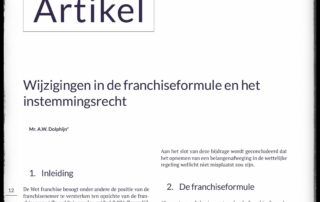Statutory anchoring of duty of care in prognostic problems
In franchising, the duty of care of franchisors plays an important role. This duty of care is now enshrined in law. In a letter dated 29 August 2016, the Minister provided clarity to the House of Representatives on this.
As of July 1, 2016, the law on acquisition fraud came into force. The aim and purport of this law is to combat acquisition fraud. The bill was presented at the time as a means of tackling phantom invoices, worthless advertisements and bogus contracts with ‘fine print’. Small businesses in particular would also need protection.
The Minister has informed the House of Representatives how this law should be interpreted in the case of franchise relationships. It has been clarified that the prognosis problem in the case of a franchise relationship also falls under the new law.
Acquisition fraud
Acquisition fraud occurs when:
– misleading statements;
– where essential information is omitted, concealed, or presented in an unclear manner;
– while that information is necessary to make an informed decision about a transaction.
If acquisition fraud is involved, this will result in a reversal of the burden of proof. In this way, the legislator also wanted to offer protection to entrepreneurs who are victims of acquisition fraud. Acquisition fraud is a form of an unlawful act and results in liability for damages. In addition, acquisition fraud has been made a punishable offence.
Acquisition fraud in franchising
In a letter to the House of Representatives, Minister Kamp has stated that with the introduction of this acquisition fraud scheme, the franchisee can derive protection from this against a franchisor. If an unsatisfactory forecast is provided by the franchisor prior to entering into a franchise agreement, the franchisee will have the benefit of the burden of proof reversal. A franchisee can also file a more targeted criminal report.
The franchisor’s duty of care is enshrined
The legal instruments such as error and deceit are difficult to prove. The franchisee must then generally demonstrate that there was intent or knowledge on the part of the franchisor of the unsatisfactory prognosis. In addition, fraud and error can result in the agreement being nullified, whereby all performances can be undone on both sides. Compensation is not obvious. There are many litigations about this issue.
With the new law, the franchisee only has to claim acquisition fraud, while the franchisor must then prove that there is no acquisition fraud. If the franchisor fails to do so, there is an unlawful act. An unlawful act also implies the obligation to pay compensation for damage. The new law prescribes greater responsibility and therefore a duty of care when franchisors issue forecasts.
Finally
The law came into effect on July 1, 2016, so forecasts provided from then on may fall under the new legal regime. Franchisees have therefore been assigned important legal instruments that considerably strengthen their position in the event of forecasting problems. Franchisors will have to be extra careful when providing a forecast.
mr. AW Dolphijn – Franchise lawyer
Ludwig & Van Dam Franchise attorneys, franchise legal advice.
Do you want to respond? Go to dolphijn@ludwigvandam.nl

Other messages
Mitigation of fine due to ‘dominant position’ of franchisor
Mitigation of fine due to 'dominant position' of franchisor ...
It is a non-competition clause at the end of the lease
In the judgment of 26 March 2024, ECLI:NL:GHSHE:2024:1035, the Court ...
Looking ahead: Bottlenecks at the end of the franchise agreement
Of course, everyone starts a collaboration with good courage. But ...
Not just a successful appeal to incorrect forecasts
Not just a successful appeal to incorrect forecasts Introduction ...
Changes to the franchise formula and the right of consent
An article by Mr. was published in the leading legal ...
The National Franchise podcast
Guests on the National Franchise podcast are: Theodoor Ludwig ...







